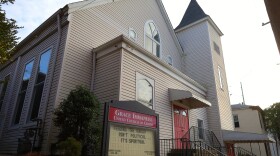The total number of homeless residents in Louisville decreased about 14 percent in the past year, according to the 2014 Louisville Homeless Census.
The latest census, released Thursday, shows that just more than 7,300 people are now without permanent housing in Louisville.
The tally is the result of a single night street count conducted earlier this year combined with a calculation of how many people were staying in shelters on the same night, said Natalie Harris, executive director of the Coalition for the Homeless.
Some of the people included in the count could have been homeless for a day--and others for years, she said.
She credits the decline, in part, to a Common Assessment team that works to determine which individuals are the most vulnerable.
"Were finding more people and getting them in our system than before," she said.
She said the Common Assessment program has also provided much more accurate data this year than in previous years.
Here's a look at how individual subsets of homeless residents compare from 2013 to 2014.
Harris said the increase in the number of homeless children is due to officials actively seeking to put families with more children into shelter, Harris said.
"If they have a unit that has three beds in it they'll try to get a mother with three kids, rather than just the next person on the list," she said.
And the data relating the victims of domestic violence shows a decrease not because an actual decrease in occurrences of domestic violence, but because a lack of service in the Louisville area, Harris said.
The Center for Women and Families shelter in Louisville has been closed for several months and people in need have been relocated, in some cases, out of the county. Therefore, they are not recorded locally.
"It looks like that number went down, but I can't say that it actually went down," she said.
Though the other sublets show substantial decline, Harris said it's still not easy to celebrate.
"If you're one of those 7,000 people, it's not great news," she said.
The amount of homeless residents in Louisville is about average for a metro area the size of Louisville, she said. The decline isn't expected to lead to a drop in funding for homeless services in Louisville.
Harris said more options for permanent housing are needed to serve the people who remain without homes, especially families.
One of the only options for families, she said, is to get on the Section 8 waiting list, which can take as many as 10 years to find housing.
"It's really hard to look at a single mom with two kids and say, 'We don't have the housing solution for you, you're going to have to figure it out on your own,'" she said.
Harris encourages residents to contact a Metro Council member and push for local government officials to dedicate funding for the Louisville Affordable Housing Trust Fund.
"We really need, locally, to focus on what kinds of housing resources we can bring to the table," she said.
She also said more landlords are needed to housing homeless veterans. Since a push to get homeless veterans in permanent housing began earlier this year more than 100 out of the 360 identified have been moved into a home, Harris said.






